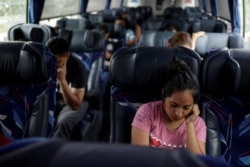Dozens of Central American migrants forced to wait in Mexico, some for half a year, for their asylum claims to be processed in the United States opted on Tuesday to return to their home countries with the Mexican government's help, officials said.
Sixty-six people from Honduras, Guatemala and El Salvador had been sent back to Mexico's Ciudad Juarez opposite El Paso, Texas, after requesting asylum in the United States, the foreign ministry said, under a contentious U.S policy known as Migration Protection Protocols (MPP).
Also known as Remain in Mexico, the policy is aimed at dissuading people from pursuing U.S. asylum claims. U.S. President Donald Trump's administration has said many claims are false and that applicants will desist once they realize they must stay in Mexico for extended periods.
U.S. asylum cases can take months or years to be decided because of a massive backlog of immigration court cases. Even hearings can take months to be scheduled.
The migrants sent home on Tuesday had lived in Ciudad Juarez for as long as half a year while waiting for judges to rule on their asylum cases, Mexico's migration institute (INM) said in a statement.
Some people had asylum hearings scheduled as far out as September 2020 and many were mothers with children, INM added.
Honduran migrant Angela Flores said she suffered during the wait in Ciudad Juarez, including extortion by police.
"We wanted to go to the United States for a better future for our children... we've suffered humiliation, ugly things," she said, without providing details.
Migrant advocates as well as asylum officers have slammed MPP for the potential to put migrants at risk by sending them for extended periods to live in some of Mexico's most violent cities.
As well, rights groups worry that migrants who give up on their asylum claims could be sent back to the same dangerous situations they fled.
Of the migrants returning on Tuesday, several declined interviews because they said they had turned in criminals, putting their lives at risk if they were to be identified.
Another migrant said she had fled an abusive husband, which in the past has been grounds to be granted asylum in the United States.
Five others, including Flores, told reporters they had hoped to seek better futures in the United States, with three lamenting poor job opportunities in their home countries.
"The people want to go back... and want to leave this dream behind," said Javier Calvillo, director of Casa del Migrante, a local advocacy group assisting the return effort.
Mexico's foreign ministry said the return trip had the support of the U.N.-backed International Organization for Migration as part of a new "temporary program of voluntary return" for migrants in northern Mexico.
It added that three Central American migrants who were not part of MPP also chose to return home.
INM said it would soon offer the return program in Tijuana and Mexicali, where MPP is also in force. U.S. authorities recently said MPP would soon be expanded to two other cities as well.
Since January, more than 16,700 Central American migrants have been sent back to Mexico under MPP to wait for their asylum cases to be processed, according to official data.






